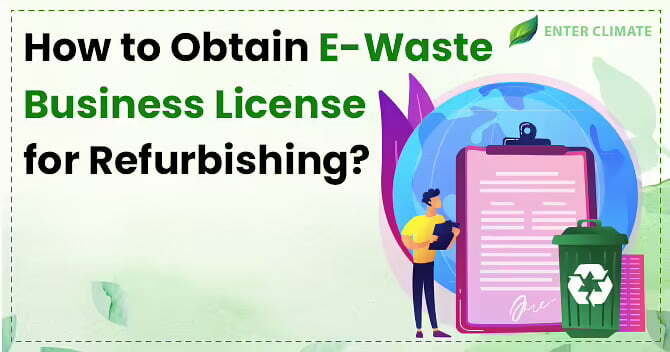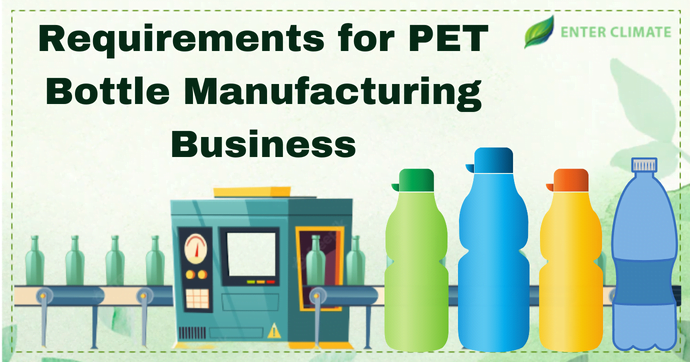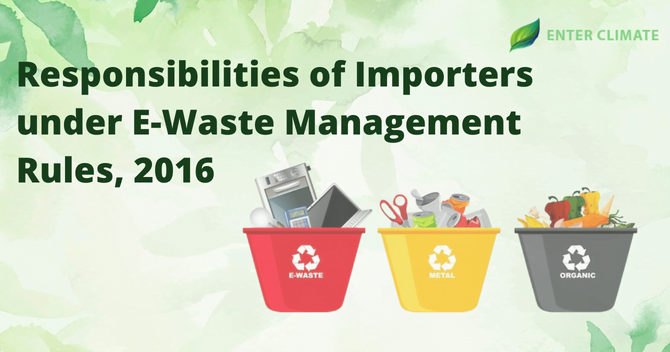How to Obtain E-Waste Business License for Refurbishing?
 16 Aug, 2022
16 Aug, 2022 
As per the latest 2021 report of the United Nations, every individual in the world produces an average of 7.6 kg of e-waste, resulting in a total of 57.4 million tonnes of e-waste globally. In India, the Central Pollution Control Board annual report revealed that around 7.71 lakh tonnes of E-Waste were produced in 2018-19, which increased from 2019-20 to 10.14 lakh, at least an increase of about 31%. E-Waste Business produced in India can be segregated into five categories which are: –
- The telecom sector, which accounts for 12% of E-Waste annually
- The government and private sectors contribute 75% of E-Waste annually
- Computer devices contribute around 70% of E-Waste annually
- The household sector accounts for 16% of E-Waste individually
- Medical equipment and used devices constitute 8% of E-Waste annually generated.
With this much E-Waste generated, it is essential that proper management of E-Waste happens to ensure it does not negatively impact the health of human beings and the environment. The most commonly used way to manage E-Way is recycling E-Waste, but nowadays cheaper and more sustainable way of managing E-Waste is refurbished.
Refurbishment, as defined under E-Waste Management Rules, 2016, is the process that improves the quality of used electrical and electronic equipment, as listed under Schedule I for extension of its lifespan for its authenticity and creativity and a person who carries whole refurbishment process of E-Waste is refurbisher.
Importance of Refurbishing
In many scenarios, refurbishing is preferred over recycling because of the many advantages that refurbishing has over recycling. Such as: –
- Refurbishing and reusing Electric and Electronic Equipment use less energy and resources than recycling.
- Refurbishing and reusing reduce the need for raw material, reducing the waste and pollution caused by obtaining those resources.
- The recycling process is expensive, while the refurbishment process is relatively cheaper.
Responsibility of Refurbisher
Some of the duties and responsibilities of the refurbisher include: –
- Refurbisher is responsible for keeping track of E-Waste management and submitting the documents to the relevant authorities for examination.
- Refurbisher must file an annual return before 30th June to the concerned State Pollution Control Board succeeding the year to which the return relates.
- The refurbisher must also collect E-Waste manufactured during the refurbishment process and transfer it to an approved recycler and dismantler.
- Refurbishers should ensure that their refurbishment operation is not harming the environment while the process of storing and transporting E-Waste.
- It is the duty of the refurbisher to ensure that the business is not endangering public health and the environment.
- The refurbisher must maintain a record of E-Waste handled in Form-2, making it available to appropriate authorities for scrutiny.
Requirements for acquiring refurbishing business
Refurbishment is proven to be more advantageous than the E-Waste Recycling process because it not only decreases Electronic Waste but also significantly improves the product and increases the lifecycle of EEE (Electrical and Electronic Equipment). Before starting a refurbishment business, an applicant has to keep particular standards in mind: –
- First, the refurbisher needs to have adequate space and land where all the E-Waste can be accumulated.
- After that refurbisher should have an enclosed area located in the establishment
- Then, the refurbisher also needs the functioning equipment required for the refurbishment process.
- At last, the business also needs a skilled and well-informed workforce.
- The premises of the refurbishing process should have: –
- Water-resistant surfaces and impermeable roofing
- General rules dictate that refurbisher of the capacity of 1 ton per day shall require a minimum of 150 square meters area for the temporary storage of E-Waste generated, space for refurbished EEE and refurbishing.
Documents Involved in acquiring E-Waste Business License for Refurbishing.
While filing for Refurbishment License, Refurbisher has to submit several attested documents like: –
- PAN Card Details
- Certificate of Incorporation
- TIN Details
- Sale deed
- Rent Agreement
- Electricity Bill
- SPCB/PCC issued Consent to establish under The Air and The Water (Prevention and Control Pollution) Act, 1981.
- SPCB/PCC issued Consent to Operate under The Air and The Water (Prevention and Control Pollution) Act, 1981.
- Authorisation Certificate approved by the DIC (District Industries Centre)[1] or any other competent agency.
- Memorandum of Association
- Partnership deed (if applicable)
- Layout Map of Business Premises
- Photo ID Proof of business owner
- Business Owner Address Proof
- Aadhar Card
Procedure for acquiring E-Waste Business License for Refurbishing
The procedure for acquiring E-Waste Business License for Refurbishing from State Pollution Control Board is regulated by E-Waste (Management) Rules, 2016. The process of registration/application involves: –
- The Refurbisher, to obtain E-Waste Business License for Refurbishing, needs to register through the official online Portal and fill out Form-I (a) of E-Waste (Management) Rules, 2016. This application is submitted along with the verified documents and Applicable Fee. For tracking the status of the application, the unique application number may also be provided
- After the form is filed, the refurbisher must submit the mandatory documents, after which the application is reviewed by concerned personnel of the State Pollution Control Board for verification and authentication.
- In case there are any inconsistencies in the submitted application or the documents are sent back to the applicant for rectification.
- In the end, if no Application is submitted and all the documents are verified, the authentication license is granted.
If the refurbisher needs to sell the refurbished Electric and Electronic Equipment, he is required to acquire EPR authorisation from the Central Pollution Control Board/State Pollution Control Board. Any refurbisher must obtain EPR Certificate before selling any refurbished Electric and Electronic Equipment.
Conclusion
Refurbishment not only decreases the accumulation of E-Waste but also increases the product’s lifecycle, which is more sustainable and better for the environment. But for establishing E-Waste Business for Refurbishing, refurbishers must fulfil all the requirements mandated under the E-Waste (Management) Rules, 2016.












